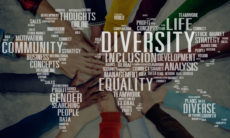I was recently interviewed by Karen Mangia, VP at Salesforce, for Authority Magazine on the Great Resignation and the Future of Work. I shared with her top five trends we see in working with our clients:
1. Companies and leaders will (finally) realize workplace culture is THE foundational driver for business success
Stakeholders such as investors, customers, and employees are insisting that the companies with which they affiliate have inclusive cultures built on diversity, equity, and inclusion. And the good news is company leaders are responding. We’ve seen this already with multiple clients who have hired us to conduct our Workplace 360° assessment and provide them with a customized Inclusive Culture Roadmap to uplevel their programs, policies, and practices for the new world of work. The goal? To become a best-in-class workplace where employees thrive driving business results for the benefit of all. As one CEO client told us, “We are headed for a big IPO and want the best culture possible to attract the best talent to get there.”
2. Investing in human capital development is essential for attracting and retaining talent
According to a 2019 LinkedIn Workforce Learning Report, 94% of employees would stay at a company longer if they received training—and that was pre-Covid. But training budgets to develop talent are typically the first to go in a business down-turn. In a work from anywhere environment where managers must learn how to lead virtual teams and leaders must figure out how to build an inclusive culture amongst a scattered workforce, providing meaningful learning and development is more important than ever. The good news is our clients are figuring this out. We’re seeing the new role of Chief Learning Officer being added to the C-suite and we are seeing major investments by companies as they strive to uplevel the skills and abilities of their leaders. Our most recent 21st Century Leadership Lab for Men is a perfect example of this. We virtually hosted 30 senior leaders across numerous industries who were eager to understand how they could better meet the needs of today’s workforce. They learned how to lead with an inclusive mindset and how to inspire by committing to change. We are seeing the impacts of the lab already as they are reviewing and changing workplace policies like pay equity, focusing on diverse hiring, and having the courage and humility to engage in tough conversations around racial justice and workplace sexism.
3. Career gaps won’t be career killers
As the research for my book, Work Pause Thrive: How to Pause for Parenthood Without Killing Your Career revealed, employers are beginning to realize that career pauses can actually make talent more resilient, more career-dedicated, and bring a breadth of skills they may not have found by following a singular path to the top. One of the leaders in our recent 21st Century Leadership Lab for Men launched a returnship program to help attract career pausers who might not otherwise make it past the hiring gauntlet which is filled with bias against career pausers. His reason? “We need women in the workforce and a career break shouldn’t hold them back.” Looks like it’s not. Nearly 3 million women left the workforce in the midst of Covid, but we’re already seeing a turnaround. According to the Bureau of Labor Statistics, women returned to work at a faster rate than men gaining 961,000 new jobs in 2021 (twice that of men). Will they stay? Only if the workplace makes it worth their while. Fair pay, time mastery, and the ability to work from anywhere are becoming must-haves to attract the best talent. And, hiring managers must get over their career gap bias to find the talent that is sitting right in front of them.
4. ERGs will become more important than ever
Corey Jones and I recently spoke with Joseph Santana on his ERG PowerTalk podcast to share our experience with the rising importance of Employee Resource Groups (ERGs). Once thought of as a nice-to-have, employee resource groups are becoming central to driving and maintaining culture within a company. Savvy employers are using them as powerful learning and development opportunities for employees. Savvy leaders are relying on them to get insight into the lived experience of their employees. Savvy companies are investing in them by providing financial resources and by recognizing that leading an ERG is a critical leadership development skill—one that should be part of an employee’s performance review. At PrismWork, we have been advising clients on how to make the best use of their ERGs and to see them as powerful resources for culture success. One Chief People Officer client shared, “We’re investing more deeply into our ERGs because, in the midst of Covid, we’ve seen how important they are to building and supporting our culture. ERGs have been critical to helping us keep our diverse employees connected and engaged.”
5. Companies will (and must) focus on their workforce’s mental health
Our research, PowHER Redefined, on the lived realities for Women of Color at work revealed that employees of all levels need access to mental health services, but that all employees don’t necessarily have pathways in place to receive these services in ways that work for them. Burn-out is real for most employees, but Women of Color who are managing the additional challenges of racism and sexism reported to us they are facing trauma with 70% reported being exhausted by the need to have to “prove myself over and over again.” Companies need to recognize that one-size-fits all solutions around mental health don’t work. As many of the women we spoke to told us, “we need coaches, mentors, and mental health experts who understand the unique challenges of being a woman and a Person of Color in a workplace that penalizes us for being both.” Smart companies understand that happy, whole people are more likely to remain loyal to a company that prioritizes their happiness and wholeness and are more likely to attract the talent they want and need in this competitive marketplace.
So I ask you, how are you going to respond to these challenges?
If your leaders are challenged by work from anywhere, if your employees are demanding a more inclusive culture, and if you are struggling to attract and retain diverse talent, we are here to help with data-driven solutions that enable you to move forward as you measure your year ahead.
Let’s approach 2022 with one unifying vision: the belief that inclusive culture led by 21st century leaders is foundational for success in this new world of work.









